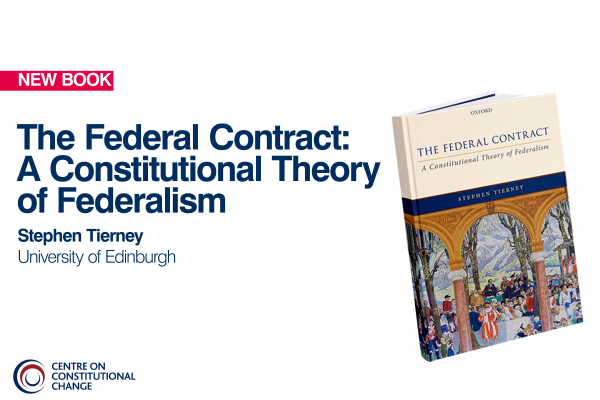CCC Fellow Stephen Tierney’s new book The Federal Contract: A Constitutional Theory of Federalism will be published by Oxford University Press in June 2022. It is available to pre-order.
Despite its pervasiveness in practice, The Federal Contract argues that federalism has been strangely neglected by constitutional theory. This is both unsatisfactory in conceptual terms and problematic for constitutional practitioners, obscuring as it does the core meaning, purpose and applicability of federalism as a specific model of constitutionalism with which to organise territorially pluralised and demotically complex states. In fact, the federal contract represents a highly distinctive order of rule which in turn requires a particular, ‘territorialised’ approach to many of the fundamental concepts with which constitutionalists and political actors operate: constituent power, the nature of sovereignty, subjecthood and citizenship, the relationship between institutions and constitutional authority, patterns of constitutional change and, ultimately, the legitimacy link between constitutionalism and democracy.
Explaining and revitalising federalism
In rethinking the idea and practice of federalism, Tierney’s book adopts a root and branch recalibration of the federal contract. It does so by analysing federalism through the conceptual categories that characterise the nature of the modern constitution: foundations, authority, subjecthood, purpose, design and dynamics. This approach seeks to explain and in so doing revitalise federalism as a discrete, capacious and adaptable concept of rule that can be deployed imaginatively to facilitate the deep territorial variety that characterises so many states in the 21st century.
"Stephen Tierney's trailblazing theory of federalism is a masterpiece in constitutional studies. Theoretically rigorous and full of vivid illustrations from the world around, The Federal Contract disrupts much of what we know about federalism and opens our eyes to new possibilities for this common form of government. No future scholarship on federalism will be complete without confronting Tierney's paradigm-shifting thesis on federalism's first principles." Richard Albert William Stamps Farish Professor in Law and Director of Constitutional Studies at the University of Texas at Austin; founding co-editor of I-CONnect, the blog of the International Journal of Constitutional Law
Pre-order your copy
Pre-order The Federal Contract: A Constitutional Theory of Federalism
Launch event
The book will be launched at various events including a webinar hosted by the University of Melbourne Law School Centre for Comparative Constitutional Law on 6 June.
- CCCS Global Public Law Seminar Series - The Federal Contract: A New Theoretical Framework for Federalism
- Monday 6 June, 5:30pm, online
- Book your place.
- View the event flyer.
Reviews
"Countless authors, writing from various disciplinary angles, have sought to explain what federalism is for or how it works (or not). Tierney takes us on a journey to unveil what, from the perspective of constitutional theory, federalism actually is. With breath-taking erudition, Tierney brings the reader to revisit concepts of constitutionalism, constituent power, sovereignty, state, nation, and people to compellingly argue that federal states are born of a distinctive, original, and inherent constitutional recognition of territorial pluralism." Johanne Poirier, Peter MacKell Chair in Federalism, Faculty of Law, McGill University
"The Federal Contract is the most significant work of federal theory and constitutionalism in a generation. Tierney lays bare the elisions and omissions in modern constitutional theory that have worked to sideline the federal idea as a distinct form of constitutional government. He responds in resounding fashion with a robust theory of federal constitutionalism, articulating the core constitutional purposes of federalism and showcasing the wide institutional variation that can achieve those aims. Tierney thus reanimates federalism's radical potential as a constitutional idea for complex societies. In so doing, he has produced a brilliant book of exceptional importance for scholars and constitutional drafters alike." Erin F. Delaney, Professor of Law, Pritzker School of Law, Northwestern University

